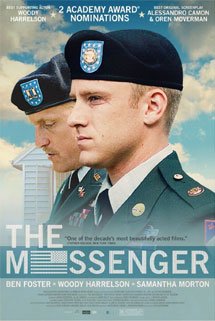“Another Devious Politically Correct Attack”

| None | Light | Moderate | Heavy | |
|---|---|---|---|---|
| Language | ||||
| Violence | ||||
| Sex | ||||
| Nudity |
What You Need To Know:
THE MESSENGER has a lot of strong, often poignant and funny scenes that are well-written, well-directed, well-edited, and well-acted, especially by Ben Foster as Will. A couple major scenes are gratuitous and add nothing, however. The movie also contains plenty of strong foul language, crude sexual content, and excessive nudity. Worst of all, despite some positive moral elements, the movie’s strong humanist, anti-religious worldview has a politically correct and offensive tone that becomes anti-American, anti-military, and abhorrent.
Content:
(HH, PCPC, ABAB, APAP, B, P, C, LLL, V, SS, NNN, AAA, D, MM) Strong humanist, politically correct worldview with overt anti-religious content and a strong Anti-American and anti-military tone throughout, plus some light moral, pro-American elements about American soldiers showing compassion to families who have lost loved ones and a Christian element where a man asks forgiveness for wrongly treating a soldier harshly; about 70 obscenities, four strong profanities, five light profanities, and man gets sick after hearing tragic news; light violence includes angry man spits at another man, woman getting tragic news slaps the messenger, implied fight, man lightly shoves another man in the back and in the head, and drunken men play war soldier in parking lot, which includes falling and pretend choking and stabbing; depicted fornication in one scene, implied fornication in another scene, sounds of implied fornication in another scene, and a crude verbal reference to oral sex; total full frontal female nudity in one shot and upper female nudity in another scene, plus brief upper and rear male nudity; alcohol use, drunkenness in two or three scenes, and alcoholic man goes off the wagon a couple times and gets drunk one or two times; smoking; and, lying, girl cheats on her future husband with her ex-boyfriend, rude behavior, widow is conflicted about her soldier husband’s death because husband came back from the war a changed and meaner man in between deployments, cynicism, and two men rudely crash a party.
More Detail:
Basically, the movie is about a sergeant wounded in the Iraq War who gets assigned to notify the next of kin of recently killed soldiers. Staff Sgt. Will Montgomery, played by Ben Foster in a star-making performance, is assigned to fellow officer Tony Stone, played by Woody Harrelson (also excellent), a recovering alcoholic who has never really seen action. Cynically, with a touch of sarcastic humor, Tony tries to show Will the ins and outs of performing this onerous duty. Even so, both are surprised by some of the reactions they get. One father angrily spits at Will when Will gives him the news about his son’s death.
Will finds himself drawn to Olivia, to whom he has just delivered the news of her husband’s death. He is still bothered, however, by his ex-girlfriend’s impending, apparently ill-conceived marriage to a meek civilian.
Eventually, Olivia tells Will the truth about her mixed feelings about her husband’s sudden death and their attraction to one another. Also, Will tells Tony about the truth of why he doesn’t feel like the wounded hero that the U.S. military has made him out to be.
THE MESSENGER has a lot of powerful and subtle elements, including the standout performances by Harrelson and especially Foster. Samantha Morton delivers a less flamboyant, more subtle performance, probably mostly because her character’s emotions are more hidden. Thus, THE MESSENGER has a lot of great individual, often poignant, and funny scenes that are well-written, well-directed, well-edited, and well-acted. The story is also structured very well.
All that said, there are some glaring and abhorrent missteps in several major scenes and in the movie as a whole.
First, the movie opens with a nude sex scene between Will and his ex-girlfriend, who has come to greet him on his return home from overseas. Later, in the third act, a drunken, disheveled Will and Tony crash the fancy rehearsal party for the ex-girlfriend and her future husband. In this scene, Will and Tony make complete jackasses of themselves in an annoying, mean way that presents a very negative portrayal of America’s soldiers.
Both these scenes are completely gratuitous and over-the-top. They add nothing to the story or the characters. The subplot involving the ex-girlfriend is also confusing. Worse, combined together, the two scenes contribute to the movie’s somewhat negative portrayal of America – not only its people, but also its soldiers. They also contribute to the movie’s ultimately negative, albeit fairly subtle, portrayal of the War on Islamic Terror in Iraq and Afghanistan. Although it’s not stated directly, or in a ham-handed fashion, like most other recent movies by the radical left in America, THE MESSENGER tells viewers that America’s involvement in wars overseas (including defensive wars) ultimately are never, ever justified.
Here, it is important to note also that, nearly all of the initial reactions by the civilian American characters in this movie toward the death of their loved ones overseas are weak, mean, or, at best, conflicted. In addition, at one point, Tony puts down the American people in general as (essentially) gullible, unthinking stooges who like going to war and like being patriotic supporters of America’s soldiers, but never realize that this means their sons or daughters might actually be killed, or come back without their arms and legs.
Furthermore, there is no mention in THE MESSENGER whatsoever of any sacrificial, patriotic, or moral elements about the current war. Such content would lend at least some positive meaning to death in war and tell us, however tragically, that at least some of these soldiers did not die in vain. In fact, when Will finally tells Tony about the battle in Iraq that conferred a hero’s status on him, Will reveals that, at the end of the battle, he accidentally did something that got an American soldier blown up by a bomb. And, that’s how Will himself was wounded!
Also toward the end of the movie, Olivia reveals to Will that the war changed her husband for the worse, not the better. She says that’s why she is conflicted about his death, which is both a relief to her and reminds her of how good a man her husband was before he went to war.
In other words, like all of the leftist movies about the War on Islamic Terror before it, THE MESSENGER tells viewers that there really is no authentic heroism in any of America’s wars or among her soldiers, that war is always and only Hell, that fighting for liberty (especially the liberty of unknown people overseas) is not really worth it, that war always makes American soldiers either suicidal or mean and violent, that the American people are simple-minded dupes, yada yada yada. Thus, like all the other movies attacking the War on Islamic Terror, THE MESSENGER has the same old treasonous, anti-American diatribe that the radical left is always trying to push down the throats of the American people and moviegoers. Of course, THE MESSENGER is much more subtle than some of these other movies, but the message is still the same old loony, libelous lies.
Thus, about the only really good things in this movie are that the two soldiers often show compassion toward the families of the dead soldiers and that the protagonist never goes to bed with the widow of the one soldier. In fact, at the very end, Will and the military widow part as friends who might eventually get together once she completes the mourning process for her dead husband.
THE MESSENGER also contains plenty of strong foul language and brief sexual nudity. In one scene, in fact, one of Tony’s sexual conquests gets up out of bed and the camera gives a full frontal shot of her nude body.
Finally, to add injury to insult, Will says several times that he does not believe in God and is not religious at all. Also, although Tony indicates he still does believe in a God, he clearly isn’t very religious either and has lots of moral problems.
This negative, secular humanist portrayal of religion and America shows MOVIEGUIDE® that atheism not only leads to philosophical and moral nihilism or meaninglessness. It also leads to anti-American political viewpoints that undermine American values. Thus, THE MESSENGER is just another gift from the entertainment industry’s humanist left-wing to Osama bin Laden and Khalid Sheikh Mohammed, the terrorist mastermind and mass murderer of 9/11, whom the current federal government has now given all the rights and privileges that every American citizen, and every American soldier, has been endowed by the Declaration of Independence and the United States Constitution.
By the way, TAKING CHANCE, a brilliant TV movie from HBO starring Kevin Bacon as a soldier who takes the coffin of a dead American soldier back to his family, is a far, far better, more redemptive, more pro-American and pro-military, and much more positive and inspiring movie than THE MESSENGER. It’s also more accurate in its portrayal of average Americans and America’s soldiers, who, after all, are our fellow citizens and family members.


 - Content:
- Content: 

